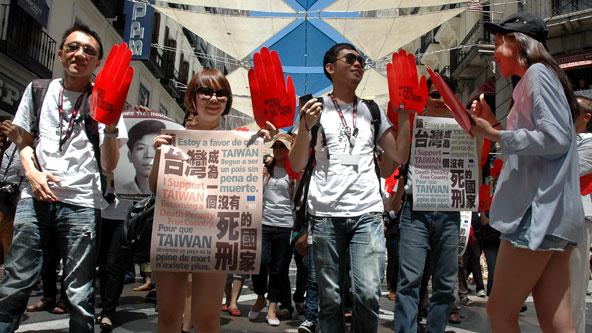
Asian progress paves the way for new strategies
World Congress
Bhutan, Nepal, Cambodia and the Philippines are the four Asian countries which have abolished the death penalty in domestic law, with Mongolia in the process of following suit after it ratified the UN Protocol on the death penalty, according to the regional overview author and academic Prof Roger Hood gave the 5th World Congress Against the Death Penalty.
“Part of the public still thinks it is not right to abolish the death penalty,” Mongolian presidential advisor Sosormaa Chuluunbaatar said to explain her country’s choice to repeal capital punishment through international law. “Yet the right to life is a fundamental right, which does not depend on any state,” she added.
The Mongolian presidency found this argument easier to pass in parliament than a purely national debate.
No more mandatory death for drug mules in Singapore
The case of Singapore also illustrated progress in Asia, with Pervais Jabbar of the World Coalition member organization Death Penalty Progress explaining how the city-state recently abolished mandatory death sentences for drug couriers. Those sentences were controversial “in that they were mandatory (excludes mitigating circumstances) and outside the category of most serious crimes,” Jabbar said.
His organization worked on the case of Yong Vui-Kong, a 19-year-old Malaysian sent to death row for possession of more than 50g of heroin, and brought several legal challenges against his sentence.
“Our challenges failed, but they had an influence in the recent decision to remove the mandatory death penalty for drugs. This is a new way to look at case law,” Jabbar said.
He also noted the emergence on large-scale online petitions during that campaign – a new way of taking action in a country where freedom of expression is limited.
“What we do is go to court and bring challenges. That’s not enough. There needs to be sensitization and media campaigns for us to have a chance in court,” he said, citing the organization of Asian activists in the Anti-Death Penalty Asia Network among the factors making this new type of campaigning possible.
Political motivations in Japan and India
The picture of the death penalty situation across the region, however, was far from being all positive.
“Thirteen Asian countries are without a moratorium on executions. That proportion is far behind the rest of the world,” Prof Hood said. He added that although China had seen a sharp decrease in executions since judicial reform in 2007, secrecy laws still surrounded the death penalty there.
Japanese lawyer Maiko Tagusari, of the World Coalition member organization Center for Prisoners’ Rights, demonstrated the politicization of capital punishment in her country.
While Democratic Party of Japan (DPJ) politicians had made abolitionist promises in the past, she said the bureaucrats blocked their efforts. After the 2012 election, DPJ lost their majority to the Liberal Democratic Party. “As soon as he was appointed, Sadakazu Tanigaki authorised several executions,” Tagusari said. “It seems he was appointed to authorize the execution of specific criminals, including members of the cult responsible for the Tokyo metro nerve gas attack,” she added, fearing more hangings.
India, too, has seen a resumption of executions with two hangings in the past year. While previous presidents had left mercy petitions pending, authorizing hardly any executions since the 1980s, India’s new head of state Pranab Mukharjee has rejected 13 mercy pleas. Navkiran Singh, an attorney with World Coalition member organization Lawyers for Human Rights International, believes this, too, is politically motivated:
Yug Chaudhry, another Indian lawyer, told the Congress that the Indian authorities had admitted to carry out the two recent executions secretly “to prevent people from stopping them in the courts – which is astonishing in a democracy”.
He added that Indian abolitionist lawyers were developing new litigation strategies. “We used to think once the president or the governor had rejected a mercy petition, it was over.
We’re now bringing challenges that go to the heart of the decision by the president.”







